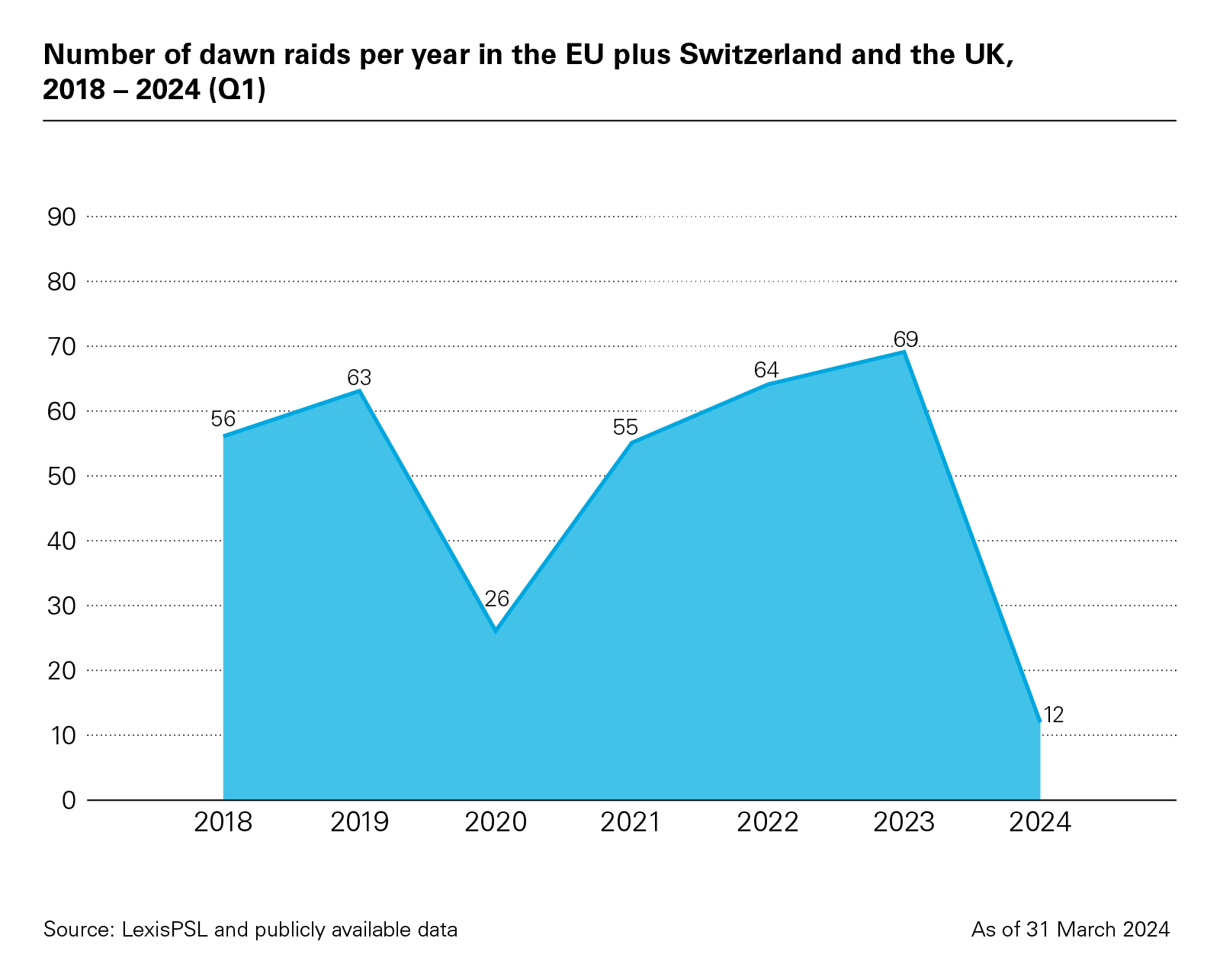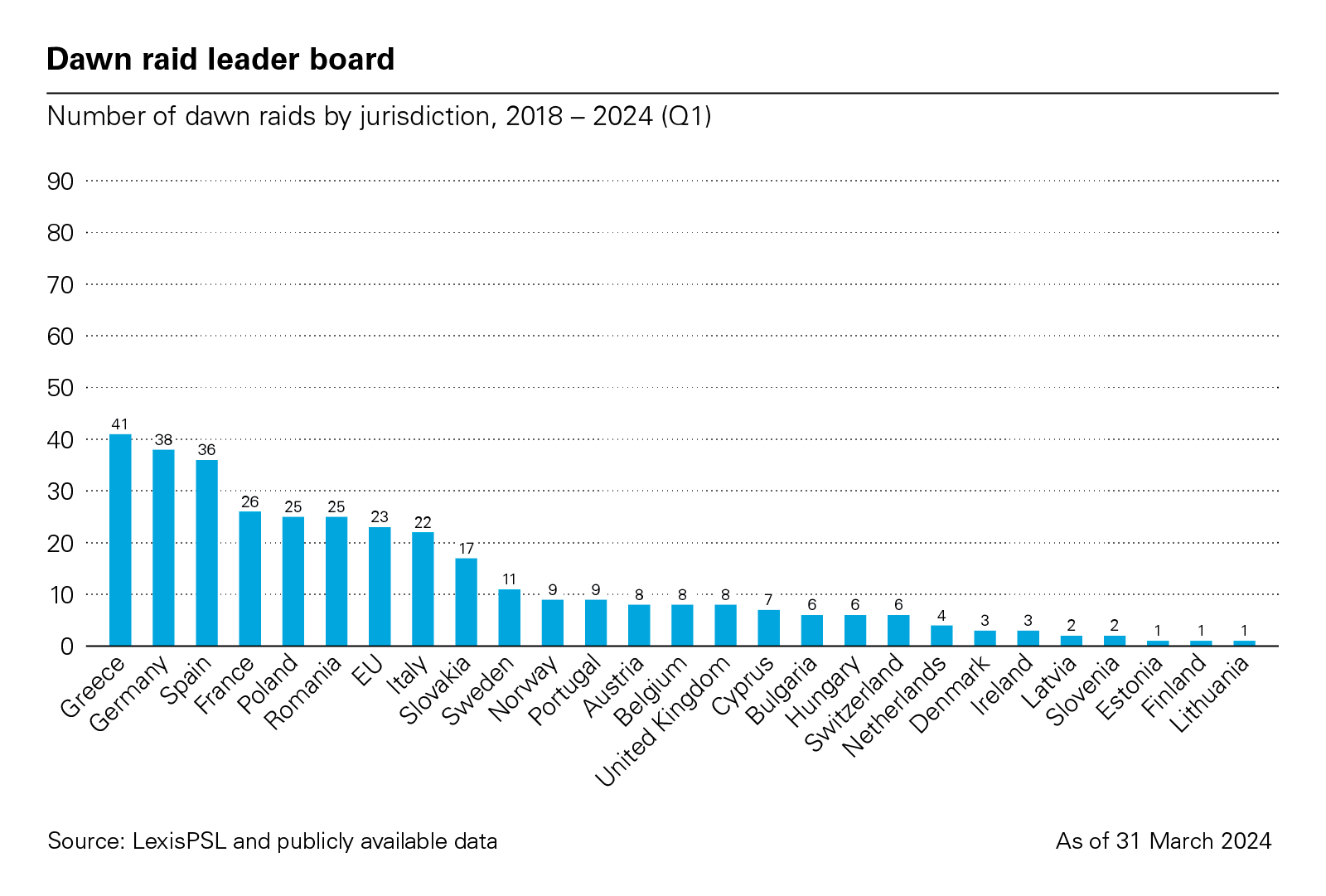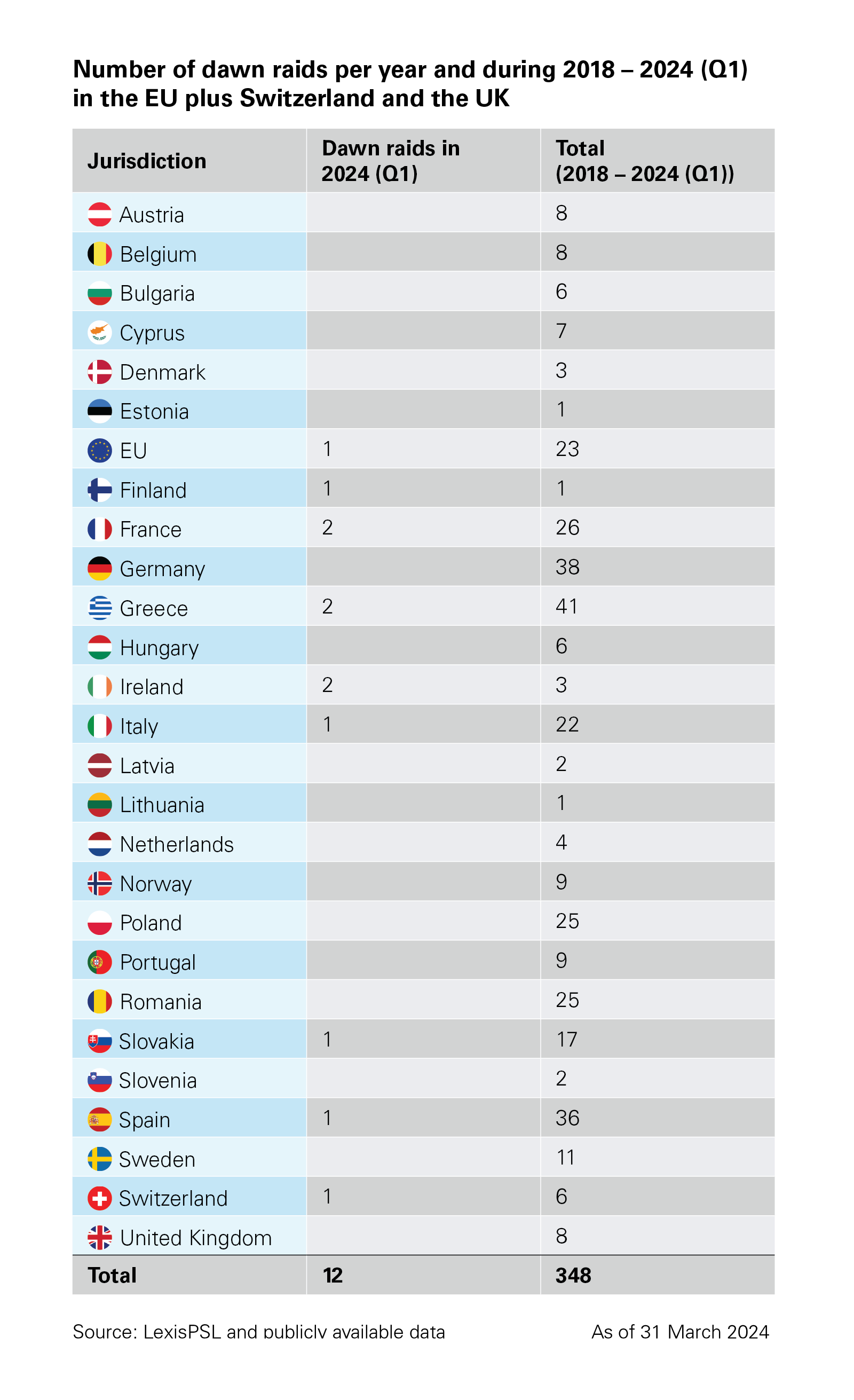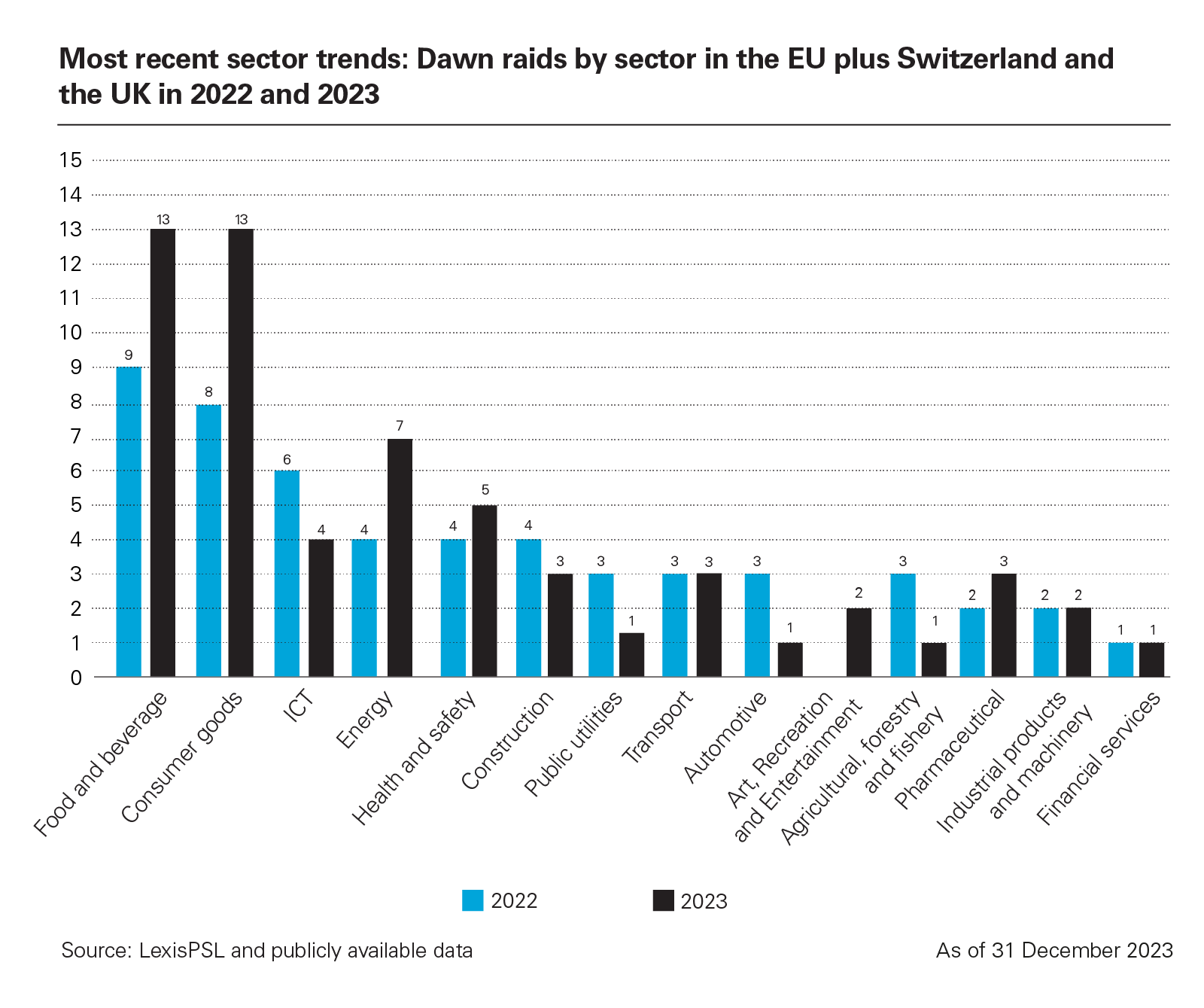
Dawn Raid Analysis Quarterly: 2024 Q1
White & Case Dawn Raid Analysis Quarterly (DRAQ) is an information resource on surprise on-the-spot inspections (dawn raids) across Europe. Here, we guide you through the latest updates and legal developments for 2024 Q1.
10 min read
The White & Case Dawn Raid Analysis Quarterly (DRAQ) is an information and discussion resource regarding surprise on-the-spot inspections by antitrust authorities (dawn raids) across Europe. DRAQ provides updates on recent case law, enforcement activity and trends.
Q1 2024 at a glance
In Q1 2024, European competition regulators carried out a total of 12 dawn raids, two fewer than in the same period last year. The most active regulators in Q1 2024 were the Irish, French and Greek competition authorities, with two dawn raids each.
The most targeted sectors in Q1 2024 were the health and safety and energy sectors (two dawn raids per sector) carried out by the Finnish, French and Slovakian authorities. The health and safety sector was also one of the most targeted sectors in Q4 2023.
Noteworthy for Q1:
- In January 2024, the European Commission announced that it had raided a number of tyre makers in several EU countries over concerns that inspected companies may have engaged in restrictive business practices.
We provide more statistics below on the number of raids and the sectors impacted, including a country-by-country list, available through our Interactive Dawn Raid map.
Key Q1 2024 legal developments
Below is a selection of key developments in Q1 2024:
- Dawn raids under the FSR and DMA?
- Maintaining confidentiality over data seized during a dawn raid in Ireland
- Czech Competition Authority proposes to strengthen its dawn raid powers
- Update on the proposal to extend legal professional privilege to in-house lawyers in France
- Polish Competition Authority fines Abexil and its top manager for obstructing a dawn raid
Dawn raids under the FSR and DMA?
Two new pieces of EU regulation with major impact allow for dawn raids: the Digital Markets Act (DMA) and the Foreign Subsidy Regulation (FSR). Both regimes are now in full swing, and it will be interesting to see if the European Commission will use its dawn raid powers under these new regimes in 2024.
The FSR provides the European Commission with powers to intervene in order to tackle foreign subsidies distorting competition in the EU internal market. It imposes mandatory notification and approval requirements for M&A transactions with significant turnover in the EU and large public tenders in EU Member States. The European Commission also has powers to launch ex officio investigations.
Under the FSR, the European Commission has powers similar to those that it has in antitrust, merger control and trade defence investigations. They include powers to enter business premises, seize electronic data, ask questions of staff members and seal premises. Unlike in antitrust investigations, in FSR investigations the European Commission even has the power to conduct inspections outside the EU with the approval of the relevant third country.
No dawn raids have yet been carried out under the FSR. While it can be expected that FSR dawn raids may be rare, dawn raids in 2024 cannot be ruled out, especially in the context of ex officio investigations.
The DMA aims to address concerns regarding "contestability" and "fairness" in the digital economy and introduces a number of per se prohibitions and obligations on "gatekeepers" in the digital sector. The European Commission has similar dawn raid powers under the DMA as it does in antitrust investigations. No dawn raids have yet been carried out under the DMA, but the European Commission is taking enforcement seriously with the announcement on 25 March 2024, only a few weeks after the DMA took effect, that it is opening an investigation into three gatekeepers for suspected non-compliance.
Maintaining confidentiality over data seized during a dawn raid in Ireland
In its February 2024 decision of Commission for Communications Regulation v Eircom Limited [2024], the Irish High Court considered the effect of the duty on a regulator under the Communications Regulation Acts 2002 to 2023 of maintaining the confidentiality of a regulated entity's information seized during a dawn raid.
The judgment will have important practical implications for dawn raids conducted by the Commission for Communications Regulation (ComReg), and other relevant regulators such as the Irish Competition and Consumer Protection Commission, by informing the engagement between regulators and the entities under investigation. The starting point is that the relevant regulator should conduct the search to remove irrelevant and privileged information from any data seized. However, given the entity under investigation's knowledge of and access to the original data, the Irish courts will expect them to contribute to that process.
Background
Major Irish telecommunications provider, Eircom Limited (Eir), published details of a proposed discount scheme for wholesale customers of fibre into homes and businesses. The relevant Irish regulator, ComReg, informed Eir that the proposed scheme did not satisfy certain regulatory requirements while raising concerns regarding competition, transparency and price control issues. Over three days in May and June 2023, ComReg conducted an unannounced search of Eir's premises and seized copies of the company's original digital data ("Seized Data").
To continue its investigation, ComReg needed to access the Seized Data while at the same time respecting Eir's rights to confidentiality regarding any legally privileged or irrelevant information. Accordingly, ComReg brought an application for the Irish High Court to approve its planned treatment of the Seized Data ("Step Plan"). ComReg did not have access to the Seized Data, pending the Court's decision, as it was held in "sealed evidence bags."
Judgment
The key issue was whether the electronic word searches were to be conducted by Eir or ComReg.
The Court concluded that the Step Plan put forward by ComReg (i.e., that it should conduct the searches while seeking to maintain confidentiality, even though this cannot be 100 percent guaranteed for every single document) is the most consistent interpretation with both the context and purpose of the Act.
The Court thus approved the Step Plan, involving the use of electronic word searches designed to eliminate privileged and irrelevant material from the Seized Data, subject to a small number of minor modifications.
Provided by Cormac Little SC, Partner, William Fry LLP (Dublin)
Czech Competition Authority proposes to strengthen its dawn raid powers
On 15 January 2024, the Czech Competition Authority (CCA) published a proposal that would, if put forward as legislation and approved by the Czech Parliament, equip the CCA with new powers aimed inter alia at increasing the CCA's dawn raid powers. The proposal follows an amendment to the Czech Competition Act from July 2023 which, by implementing the ECN+ directive into Czech law, already substantially strengthened the CCA's powers.
The CCA published the proposal following a meeting relating to the price of food products in the Czech Republic between the CCA Chairman and Czech government, including the prime minister Petr Fiala. The meeting took place in the context of political pressure and extensive public criticism of the CCA regarding alleged oligopolistic market structures.
The proposal relates to (i) the CCA's power to conduct dawn raids, and (ii) its access to location data of the mobile devices of managers.
The CCA claims that it currently has only limited ability to carry out dawn raids, which supposedly presents a major obstacle for cartel investigations. According to the CCA Vice Chairman Kamil Nejezchleb, the CCA currently faces a high evidential threshold that is difficult to meet and is subject to review by the courts. In essence, however, these are standard procedural safeguards: court reviews to determine whether a suspicion of competition-law infringement is sufficiently concrete, and the requirement that inspections are limited in scope. The CCA named oligopolistic markets or markets with strong network effects (e.g., digital markets) as examples of potential candidates for ad hoc inspections. The CCA's proposal is controversial because the new rules could lead to business disruption and could be used arbitrarily by the CCA's future management.
The CCA further stated that it is crucial for the authority to receive information on telecommunication exchanges between managers and other members of the staff of a competitor in order to detect the existence of prohibited agreements. The CCA reasoned that in some EU Member States, such as the Netherlands and Lithuania, competition authorities have access to such data. They stressed the importance of location data linked to electronic devices for remote communication (i.e., typically, mobile phones) for their investigations, given that these devices are carried even to face-to-face meetings. The Czech Electronic Communications Act currently contains an exhaustive list of entities that may request location and operational data of mobile devices from mobile operators. The CCA would like to be added to this list and would use such data to prove that in-person meetings have taken place. According to the CCA's Chairman, the CCA proposes that it would only have access to such data with the consent of the court.
The CCA Chairman has stated that the proposal aims to initiate political debates and will serve as a basis for future legislation. It is yet to be determined how the final proposal will precisely expand the CCA's authority to combat anti-competitive agreements.
Update on the proposal to extend legal professional privilege to in-house lawyers in France
As reported in the Q4 2023 issue of the DRAQ, in November 2023 the French Constitutional Council rejected the proposal on purely formal grounds, on the basis that the provisions were not compliant with the French Constitution. In particular, the Council considered that the introduction of the legal privilege for in-house lawyers' consultations had no link with the provisions of the bill subject to the examination (the bill related to the Ministry of Justice's Orientation and Planning for 2023 to 2027). The bill has been back on the table since 14 February 2024. The draft bill was transmitted to the French National Assembly on 15 February 2024, but no date has been set at this stage for the designation of a specific commission or for a public debate. For more details about the proposal, please read here.
Polish Competition Authority fines Abexil and its top manager for obstructing a dawn raid
In October 2022, the Polish Competition Authority conducted a dawn raid of home and garden accessories retailer Abexil Babala due to price-fixing concerns. The company's managing partner was requested to hand over his business mobile phone for the authority to search for evidence of unauthorized agreements. The managing partner initially handed over another phone, which had no stored contacts and only few text messages and calls from the day of the search. The "real" business phone was not provided until the next day, following an additional request from the authority. The authority concluded that the employee had obstructed the inspection. By handing over a different phone, the managing partner had hindered operations and prevented the collection of evidence in the ongoing investigation. On this basis, the Polish Competition Authority imposed on the company a fine of PLN 150,000 (approx. €32,000) and on the manager a fine of PLN 100,000 (approx. €21,000).
Fining individuals in the context of antitrust dawn raids is unusual. Besides the Polish Competition Authority, the Hellenic Competition Commission has the power too and has used it recently by imposing one of the highest-ever penalties on an individual outside of the United States. The European Commission does not have such powers.
Interactive Dawn Raid map
Hover over the highlighted countries to get a closer look at the enforcement activity of the respective National Competition Authorities since 2021.
Austria2024
2023
2022
2021
Belgium2025
2024
2023
2022
2021
Bulgaria2025
2024
2023
2022
2021
Croatia2025
2024
2023
2022
2021
Cyprus2023
2022
2021
Czech Republic2025
2024
2023
2022
2021
Denmark2025
2023
2022
2021
Estonia
Finland2025
2024
2023
2022
2021
France2025
2024
2023
2022
2021
Germany2024
2023
2022
2021
Greece2025
2024
2023
2022
2021
Hungary2025
2023
2022
2021
Ireland2025
2024
2023
2022
2021
Italy2025
2024
2023
2022
2021
Latvia2025
No dawn raids for the period 2021 – 2023 Lithuania
Luxembourg2025
2024
2023
2022
2021
Netherlands2025
2023
2022
2021
Norway2025
2023
2022
2021
Poland2025
2024
2023
2022
2021
Portugal2024
2023
2022
2021
Romania2025
2024
2023
2022
2021
Slovakia2025
2024
2023
2022
2021
Slovenia2024
2023
2022
2021
Spain2025
2024
2023
2022
2021
Sweden2023
2022
2021
Switzerland2025
2024
2023
2022
2021
United Kingdom2023
2022
2021
EU2025
2024
2023
2022
2021
|
A look at the statistics
The information below has been sourced from LexisPSL, and is based on dawn raids that have been publicly announced by competition authorities. The LexisPSL information was supplemented from public sources in jurisdictions where further information was available. Since not all competition authorities announce every dawn raid, the data below likely underestimate the number of raids. The sector charts reflect dawn raids in which the sectors were identified by the competent authorities. In some jurisdictions (e.g., Germany), the authority publishes the number of raids without identifying the sector. As a result, the statistics in the charts below may underestimate the actual number of dawn raids by sector and country.
As of 31 December 2023
Source: LexisPSL and publicly available data
White & Case means the international legal practice comprising White & Case LLP, a New York State registered limited liability partnership, White & Case LLP, a limited liability partnership incorporated under English law and all other affiliated partnerships, companies and entities.
This article is prepared for the general information of interested persons. It is not, and does not attempt to be, comprehensive in nature. Due to the general nature of its content, it should not be regarded as legal advice.

 View full image: Number of dawn raids per year in the EU plus Switzerland and the UK, 2018 – 2024 (Q1) (PDF)
View full image: Number of dawn raids per year in the EU plus Switzerland and the UK, 2018 – 2024 (Q1) (PDF)
 View full image: Dawn raid leader board (PDF)
View full image: Dawn raid leader board (PDF)
 View full image: Number of dawn raids per year and during 2018 – 2024 (Q1) in the EU plus Switzerland and the UK (PDF)
View full image: Number of dawn raids per year and during 2018 – 2024 (Q1) in the EU plus Switzerland and the UK (PDF)
 View full image: Most recent sector trends: Dawn raids by sector in the EU plus Switzerland and the UK in 2022 and Q1 – Q4 (PDF)
View full image: Most recent sector trends: Dawn raids by sector in the EU plus Switzerland and the UK in 2022 and Q1 – Q4 (PDF)